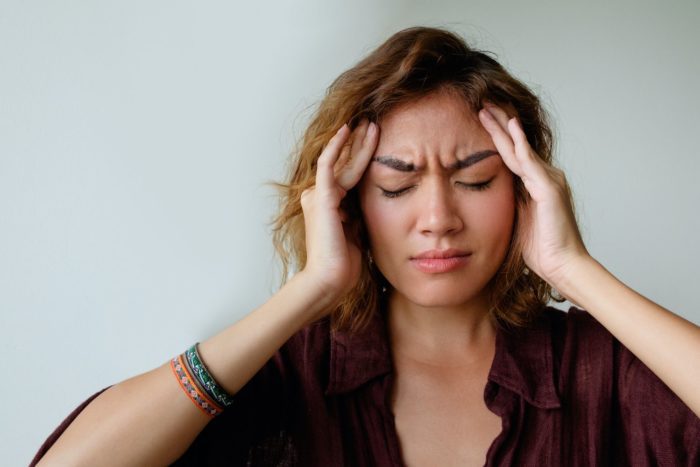Bruxism—or teeth grinding—is a common condition where someone clenches or grinds their teeth together. Generally, mild and occasional grinding won’t hurt your teeth; persistent grinding can cause long-term damage.
It is not uncommon to grind, clack, or clench your teeth while awake due to stress or anxiety. But you may be clenching and grinding your teeth at night without realizing it.

Am I Grinding My Teeth?
Teeth grinding puts a lot of stress on your teeth and jaws, so you may notice pain or soreness in your face, jaw, neck, or even shoulders. After some time, you may have issues opening and closing your jaw completely.
The pain may feel like an earache; however, the pain is not actually with your ear. The tension from grinding your teeth can cause headaches that begin in the temples or headaches stemming from tight muscles in the shoulders and neck. Constant teeth clenching and grinding may affect your sleep schedule.
Grinding your teeth can also cause physical damage to your teeth, such as worn down enamel, chipped, fractured, or broken teeth, or possibly loose teeth. Chipped or broken teeth are susceptible to infections and may require a root canal.
If the enamel on your teeth is worn down, it will cause pain or increased sensitivity to hot and cold temperatures. Once the enamel is lost, it is impossible to get it back.
Why Am I Grinding My Teeth?
The exact causes of teeth grinding are not quite understood. Doctors can’t pinpoint an exact cause, but it may be a combination of factors, including genetic, psychological, or physical issues.
If you grind your teeth at night, you may not be aware of your behavior. While there is no direct cause, it could be related to stress or sleep-related chewing.
If you grind or clench your teeth while you are awake, it may be related to stress or emotions. Anxiety, stress, frustration, tension, and anger can overwhelm the senses and cause you to grit your teeth, perhaps as a coping strategy. It may also occur due to deep concentration.
There are certain risk factors that may increase your chances of bruxism:
- If you have a family member who grinds their teeth, it may be possible that you might as well. Bruxism is common amongst families, so your family history may be a factor.
- There are certain types of medications or substances that include teeth grinding as a side effect. Some psychiatric medications, alcohol, recreational drugs, tobacco, and caffeine all carry an increased risk of grinding your teeth.
- Your stress level or personality type may increase your chances of bruxism. Patients with high levels of stress report more teeth clenching or grinding. Those with more hyperactive or aggressive personalities may also have bruxism.
- Certain physical or mental health disorders can be contributing factors to bruxism. Parkinson’s disease, epilepsy, attention-deficit/hyperactivity disorder (ADHD), or even sleep apnea may be directly related to instances of teeth grinding.
